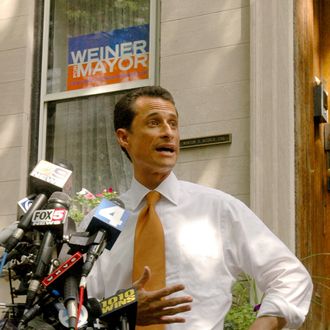
On the same day the epic 8,000-word New York Times Magazine profile that launched Anthony Weiner’s comeback effort hit newsstands, the fallen congressman added more fuel to the debate over the seriousness of his mayoral bid by releasing a booklet outlining his plan for keeping New York City “the capital of the middle class.” The New York Times notes that the 21-page document is nearly identical to one he released when he was considering running for mayor in 2009, using the same title, theme, and in many spots lifting passages direct from the old booklet. However, there were a few notable differences. A photo of Weiner in a defiant stance has been removed from the cover, as well as references to his former title, and the word “impotent,” which was used in the previous version to describe the city’s relationship with the MTA.
While few, save for similarly disgraced former governor Eliot Spitzer, seem to think he has any shot at winning the mayoral race, Weiner’s comments on the policy paper suggest that the emotional profile was just a taste of things to come. In a phone interview with the paper, Weiner refused to discuss anything but the booklet. Per the Times:
“I would take it on face value,” he said of the report. “I want these issues to be discussed and debated irrespective of who’s in the race.”
He acknowledged that the report was an “amalgam” of his ideas over the years, but he became exasperated when pressed on the similarities between the document and its 2008 predecessor. “To some degree, this is the problem with reporting on politics these days,” he said, trailing off before exhaling loudly.
Mr. Weiner was asked if the timing of the release, coming shortly after the Times Magazine article, could be viewed as a signal that he would soon enter the race. “I’ll leave it to the reader to try to derive motivation,” he replied.
While the significance of the document is sure to generate more discussion than the ideas within, Weiner does have some interesting new proposals (though major issues in the current race, such as stop and frisk, are conspicuously absent). Weiner proposes creating a city-run health-care program for “uninsured and underinsured” New Yorkers, requiring sex offenders to wear GPS tags, and holding a regular “Mayor’s Question Time” modeled on the British practice of having the prime minister take questions from members of Parliament. That sounds like fun, and the kind of thing Weiner might one day regret bringing up.






























